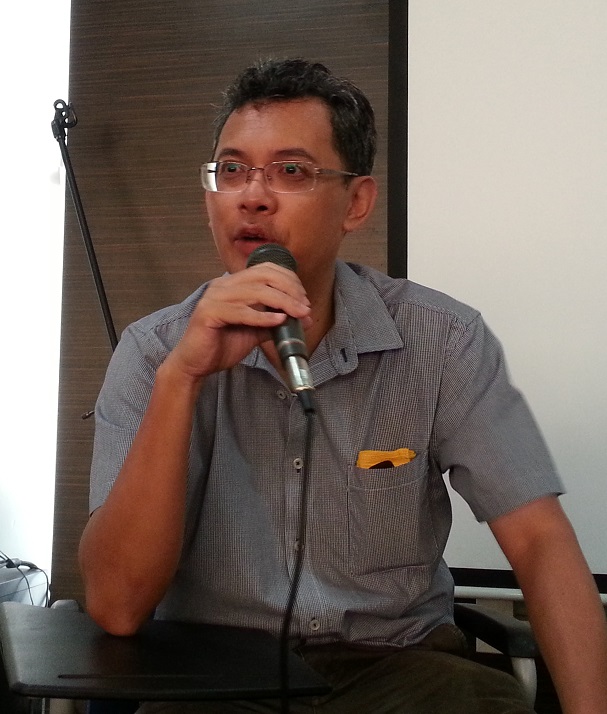Disrupt: No joyride for bumiputera firms either
By Edwin Yapp December 19, 2013
- Bumiputera tech entrepreneurs not banking merely on government, GLC contracts anymore
- Still difficult to attract talent to such firms; more successful testimonies needed to pave the way

THE perception that bumiputera-led technology companies have an easier time winning contracts from the Government because of their purported special privileges is no longer true, a panel of entrepreneurs said yesterday (Dec 18).
Speaking at the DNA-TeAM Disrupt forum themed: Bumiputera ICT companies: Why have there not been any breakouts yet?, Farith Rithauddeen, cofounder of the Skali Group, said that it was neither harder nor easier for a bumiputera company to win contracts just because of its status.
“No, it is not easier for a bumiputera company, but then again it’s not any easier for any non-bumiputera company nor even foreign companies either. I think the [technology] ecosystem in Malaysia is very challenging for all to operate in.
“Being a bumiputera company may probably get you through the door and get you [an opportunity to make] a presentation, but it will not necessarily get you the contract unless you have the competitive strength,” he said.
Farith’s Skali Group is one of the few bumiputera-led tech companies that came up during the first dotcom boom. It survived the bust and went on to win a major portal revamp project from the Government in 2008, which was valued at around US$79.6 million (RM256 million).
The company raked in revenues of about RM60 million last year and is slated to be publicly listed next year on the Bursa Malaysia stock exchange.
Pointing to an open tender project issued by the Malaysian Government his company went into a few years ago, Farith claimed Skali managed to outbid 39 other vendors and won the project based on its capabilities and pricing.
“Yes, we were a bumiputera company, but out of the other 39 bidders, there were not only other bumiputera firms but also non-bumiputera firms and foreigners which fought for the [tender].
“If you’re talking about whether it’s easy for a bumiputera company to win government contracts, don’t forget there are another 10 more bumiputera companies that are also trying to corner that project. I have to compete with everyone,” he said.
 ‘Bumiputera’ is the term used for the largely, though not restricted to, Malay Muslims in Malaysia, who enjoy special privileges in education, housing, and civil service appointments. In the business world, many government contracts would stipulate a procurement preference for firms with a majority bumiputera ownership.
‘Bumiputera’ is the term used for the largely, though not restricted to, Malay Muslims in Malaysia, who enjoy special privileges in education, housing, and civil service appointments. In the business world, many government contracts would stipulate a procurement preference for firms with a majority bumiputera ownership.
Meanwhile Farith’s fellow panellist Azlan Yaacob (pic), founder of Axile Consulting, noted that as an entrepreneur, there’s no doubt that one would look for any advantage one can get to help with the business, including using one’s status as a bumiputera.
Also the deputy president at TeAM (Technopreneurs’ Association of Malaysia), Azlan said as an entrepreneur, one must always reach out to every single network and build a relationship, and hopefully through that relationship, one would be able to further one’s business interests.
“Some of these bumiputera entrepreneurs are very savvy and they have access to government-linked corporations (GLCs) such as Khazanah Nasional (the investment holding arm of the Malaysian Government), Felda (Federal Land Development Authority), and LTAT (Lembaga Tabung Angkatan Tentera or the Armed Forces Fund Board),” he said.
“If the Government has created all these agencies, of course we are going to talk to them. But we have to give something back. We must create economic value and create jobs.
“If you want something from the Government, you must be willing to give something back,” he said.
For audience member Mohd Sharizal Mustapah Kamil of Malaysia Debt Ventures (MDV), it’s not so much about whether they are bumiputera entrepreneurs or not, as MDV has a policy of not discriminating between bumiputera or non-bumiputera companies.
Both types are evaluated on the same basis outlined in MDV’s evaluation criteria.
Commenting on the discussion from the floor, the vice president of MDV’s business and technology advisory board said, “From a financing perspective, bumiputera entrepreneurs come in all shapes and sizes.
“The key criterion that separates the good from the bad is integrity, which cannot be manufactured nor trained. It has to be something from within themselves,” he said.
 Sharizal said those who have integrity, regardless of their bumiputera status, are the ones that invariably pay back the loans they take from MDV.
Sharizal said those who have integrity, regardless of their bumiputera status, are the ones that invariably pay back the loans they take from MDV.
“The ones that complete their projects and pay back their loans are the ones who come back for more financing, and these are the ones we deem successful entrepreneurs,” he said.
Begging to differ from the panel was audience member Bikesh Lakhmichand (pic), chief executive of Google-certified training centre iTrain, who believes that some government agencies still favoured bumiputera companies for their contracts.
Commenting from the floor, Bikesh said perhaps this practice may not occur at the levels of large organisations like Skali, but argued that small-sized entrepreneurs face this situation quite regularly.
“I've lost a lot of deals just because I'm not a bumiputera company,” he claimed.
“People downright come to us and ask us to put our services through a bumiputera company, so it's still a blatant [practice]. We don't talk about it, but it happens all the time,” he said, adding that he doesn’t believe that this practice would stop anytime soon.
Next page: Genuine bumiputera entrepreneurs also disdain favouritism


